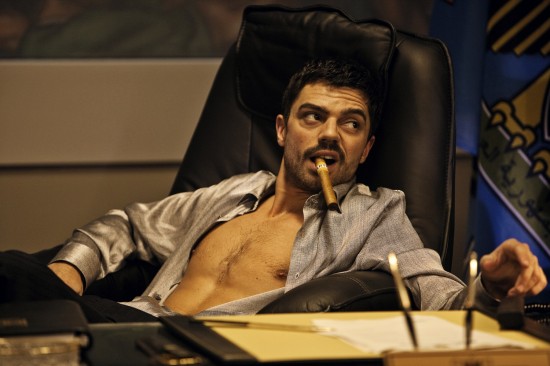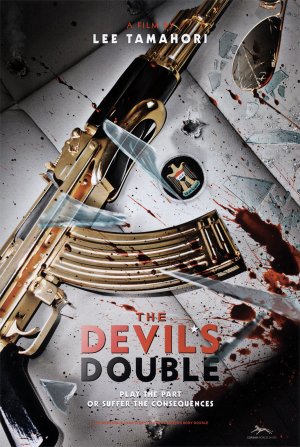
No less than this generation’s Scarface, Lee Tamahori’s The Devil’s Double is an indie-funded epic about the son of Saddam Hussein and his unwilling look-alike. Both roles are played by British thespian Dominic Cooper with the kind of blind, untamed ambition that people remember, good and bad. Tamahori matches Cooper with glossy, endlessly overwrought direction. There are no strings attached to this production, those with the money apparently leaving Tamahori and his star to run wild. Cooper’s living an actor’s dream: the freedom to play-act in front of the mirror.
Appropriately, young Uday Hussein is the equivalent of a bratty child. His crooked teeth and uncombed hair only add to his fetal mindset. He’s also a psychopath, raping young women (children in some cases) and shooting both friends and enemies only after he’s sliced their Achilles’ tendons apart with a jewel-covered sword. The man who looks like him, Latif, is a young mature Iraqi working man who Uday takes a liking to. He chooses Latif as his stand-in. Latif, of course, has no choice in the matter.
Cooper and company speak in semi-Middle Eastern accents, casually slipping back into British as though it were still 1950s Hollywood. The set decoration, courtesy of Paul Kirby, is large, glossy and bright. Lens flares populate the frame, momentarily shifting focus away from the gigantic set pieces that only complement the full scale of the across-the-board over-acting going on here.
Archival footage of Iraqi firefights awkwardly sit next to the drug-fueled, melodramatic scenes constructed by screenwriter Michael Thomas. Cooper applies a squeaky, adolescent voice to his Uday against the soft-spoken stoicism of Latif. On the stage, Cooper would command the theater. On the silver screen, he’s more likely to divide the audience.
How far those watching are willing to dive into Tamahori, Thomas and Cooper’s madness will determine their level of enjoyment. Blood runs through most every scene, along with yelling, sex and nudity. Any sense of real insight into Saddam Hussein’s family and/or psyche is never once considered. Philip Quast‘s performance as Saddam scoffs at any thought of imitation. The Iraqi leader is the shadow of evil, lacking much character at all. He enters the frame only after his disappointing son needs a talking-to. This father’s method of punishment involves large knives pointed at genitalia.
How accurate any of this actually is matters not a bit. None of it is believable on the screen, and none of it is boring. Something like an edgy 9/11 joke, this blood-soaked celebration of one of America’s great villains and his insane son refuses to approach its taboo subject with any kind of weight or substance, opting instead for comedy in the face of this kind of terribleness. Some will laugh, others will guffaw.

Are you interested in this kind of subject told this kind of way? Have you seen Tamahori’s other films?

